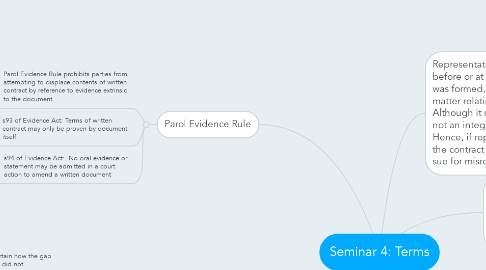
1. Parol Evidence Rule
1.1. Parol Evidence Rule prohibits parties from attempting to displace contents of written contract by reference to evidence extrinsic to the document
1.2. s93 of Evidence Act: Terms of written contract may only be proven by document itself
1.3. s94 of Evidence Act: No oral evidence or statement may be admitted in a court action to amend a written document
2. Implied terms
2.1. Implied by court
2.1.1. 3 step process set out in Sembcorp Marine: 1. Ascertain how the gap arises. Implication will be considered only if court discerns that gap arose because party did not contemplate the gap. 2. Court considers whether it is necessary in the business/commercial sense to imply a term for contract efficacy. Business efficacy test is use where the court implies a term into the contract to ensure business efficacy. It must have been intended by the parties to ensure that their contract will proceed on a normal business line. 3. Court considers the specific term to be implied. The officious bystander test is use where parties would have responded "oh of course" had the proposed term been put to them at the time of the contract.
2.2. Implied by custom
2.2.1. customs and practices of a particular trade which has become so well known that it does not need to be expressed
2.3. Implied by statute
2.3.1. implied by statute operate by force of law
3. Classification of terms
3.1. Condition
3.1.1. fundamental and essential to the contract. breach of condition --> Terminate/affirm contract and sue for damages
3.2. Warranty
3.2.1. Less important and does not affect the main purpose of the contract. If breach --> Trivial = sue for damages. Serious consequences = Terminate and sue for damages
3.3. Innominate
3.3.1. too complicated due to debatable nature of term
